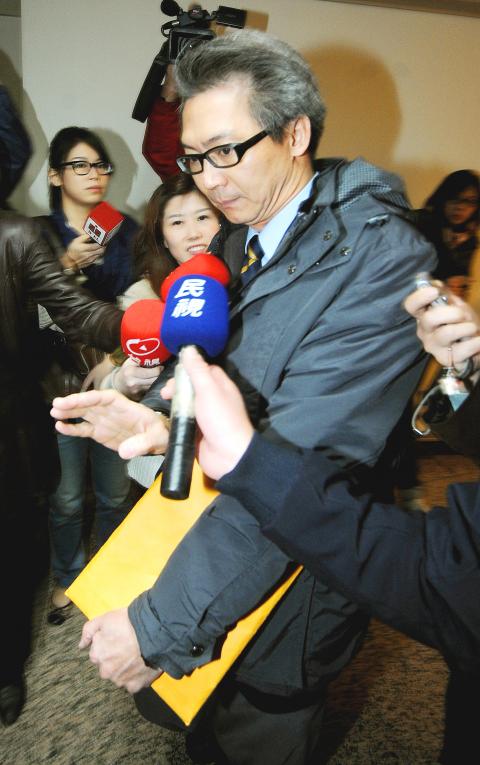Premier Sean Chen (陳冲) yesterday dismissed comments about rising NBA star Jeremy Lin’s (林書豪) success being attributable to his eating US beef, made by a member of the Cabinet task force convened to address the issue of imports of US beef containing ractopamine residue.
“Saying that NBA players play basketball well because they eat US beef is not a scientific argument,” Chen said. “We need evidence and [medical] literature to prove [such an argument.]”
Chen made the remarks in response to a report in the Chinese-language Apple Daily yesterday, which quoted Wang Jen-hsien (王任賢), director of China Medical University Hospital’s Department of Infection Control, as having told the task force on Feb. 10 when it convened its first meeting that “Jeremy Lin made it to the NBA because he eats US beef. Taiwanese couldn’t [make it to the NBA] because they don’t [eat US beef.]”

Photo: Liu Hsin-de, Taipei Times
Born and raised in the US, Lin is the first American of Taiwanese descent to play in the NBA. The performance of the new starting point guard for the New York Knicks over the past two weeks has given him an international following.
Elaborating on his remarks yesterday, Wang said he meant to highlight that the controversy over whether Taiwan should allow -imports of US beef products containing traces of ractopamine was a toxicological issue that “we lack a clear understanding about in the country.”
He said that ractopamine was mistakenly viewed as a highly toxic drug.
Ractopamine is a type of beta-agonist, a class of drugs that accelerate the maturation of animals and increases the lean meat ratio, Wang said in an op-ed article. Although ractopamine has not been approved for use in humans, other beta--agonists are used, for example bronchodilators, a medication used to treat wheezing in asthmatics or those who have influenza, he added.
The chance of being poisoned by consuming beef with ractopamine residues is very low because cattle excrete ractopamine within 24 hours of consuming the feed additive, which is as fast as it is excreted from the human body after people eat beef, Wang said.
Amid calls from the US to ease the ban, which have escalated since the Jan. 14 presidential election, the government set up an ad hoc task force on Feb. 6 to serve as a technical advisory committee to consider whether ractopamine in cattle or hogs poses a risk to human health.
Lin Chieh-liang (林杰樑), a toxicologist at Linkuo Chang Gung Memorial Hospital who was not invited to sit on the committee, disagreed with Wang’s comments, saying that the comparison of the relative health risks from ractopamine faced by Taiwanese and US meat consumers was incorrect.
Taiwanese eat more animal offal than Americans and there is a much greater and longer-lasting presence of ractopamine residue in viscera, Lin said.

AGING: As of last month, people aged 65 or older accounted for 20.06 percent of the total population and the number of couples who got married fell by 18,685 from 2024 Taiwan has surpassed South Korea as the country least willing to have children, with an annual crude birthrate of 4.62 per 1,000 people, Ministry of the Interior data showed yesterday. The nation was previously ranked the second-lowest country in terms of total fertility rate, or the average number of children a woman has in her lifetime. However, South Korea’s fertility rate began to recover from 2023, with total fertility rate rising from 0.72 and estimated to reach 0.82 to 0.85 by last year, and the crude birthrate projected at 6.7 per 1,000 people. Japan’s crude birthrate was projected to fall below six,

US President Donald Trump in an interview with the New York Times published on Thursday said that “it’s up to” Chinese President Xi Jinping (習近平) what China does on Taiwan, but that he would be “very unhappy” with a change in the “status quo.” “He [Xi] considers it to be a part of China, and that’s up to him what he’s going to be doing, but I’ve expressed to him that I would be very unhappy if he did that, and I don’t think he’ll do that. I hope he doesn’t do that,” Trump said. Trump made the comments in the context

SELF-DEFENSE: Tokyo has accelerated its spending goal and its defense minister said the nation needs to discuss whether it should develop nuclear-powered submarines China is ramping up objections to what it sees as Japan’s desire to acquire nuclear weapons, despite Tokyo’s longstanding renunciation of such arms, deepening another fissure in the two neighbors’ increasingly tense ties. In what appears to be a concerted effort, China’s foreign and defense ministries issued statements on Thursday condemning alleged remilitarism efforts by Tokyo. The remarks came as two of the country’s top think tanks jointly issued a 29-page report framing actions by “right-wing forces” in Japan as posing a “serious threat” to world peace. While that report did not define “right-wing forces,” the Chinese Ministry of Foreign Affairs was

PREPAREDNESS: Given the difficulty of importing ammunition during wartime, the Ministry of National Defense said it would prioritize ‘coproduction’ partnerships A newly formed unit of the Marine Corps tasked with land-based security operations has recently replaced its aging, domestically produced rifles with more advanced, US-made M4A1 rifles, a source said yesterday. The unnamed source familiar with the matter said the First Security Battalion of the Marine Corps’ Air Defense and Base Guard Group has replaced its older T65K2 rifles, which have been in service since the late 1980s, with the newly received M4A1s. The source did not say exactly when the upgrade took place or how many M4A1s were issued to the battalion. The confirmation came after Chinese-language media reported